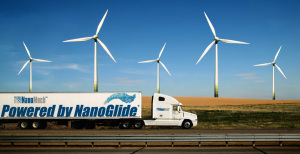Sep 30 2010
U.S. Department of Energy (DOE) has awarded NanoMech, Inc. a grant for $1 million to develop and test a pilot-scale production facility for manufacturing of NanoGlide®.
NanoGlide is a family of next generation lubricant additives engineered at nano scale to significantly increase performance by reducing friction and wear in extreme pressure conditions. Its applications range from earth movers and wind turbines to helicopters, trucking fleets, automobiles, and industrial machinery.
 NanoGlide substantially reduces friction in moving parts from wind turbines to heavy machinery to trucking fleets.
NanoGlide substantially reduces friction in moving parts from wind turbines to heavy machinery to trucking fleets.
Jim Phillips, NanoMech’s Chairman, stated that, “By increasing the reliability and energy efficiency of vehicles, locomotives, wind turbines, diesel-powered trucks and other vital transport and machines, NanoMech directly solves the most critical challenges facing our country by dramatically increasing the use of renewable energy sources, reducing dependence on foreign energy sources, and increasing productivity of US industries. NanoGlide can have an immediate impact on better energy efficiency, sustainability, and increased mechanical performance worldwide."
NanoGlide is a breakthrough invention from nanoparticle research at the University of Arkansas under the direction of NanoMech CTO and UA professor Dr. Ajay P. Malshe. This patent-pending technology is exclusively licensed to NanoMech Corporation.
Friction is one of the major reasons for failure of vital engineering components and systems used in aerospace, military, and industrial applications. The annual cost of friction and wear-related energy and material losses is estimated to be over $700 billion -- 5% to 7% of the United States’ $14 trillion gross national product.
“We are very pleased that the Department of Energy has recognized the outstanding capabilities of this innovation and the importance of scaling up its production so that NanoMech can bring this product to market, serving our national interests and a solution for leading industries,” said Keith Blakely, NanoMech’s Chief Executive Officer. “We are excited to gain acceleration expanding our nanomanufacturing capability working with DOE and our strategic partners to make NanoGlide available commercially to address the broad range of lubrication challenges that are out there today.”
The Small Business Innovation Research (SBIR) Phase II grant follows an earlier Phase I project that NanoMech recently completed.
DOE’s announcement noted that in Phase I “NanoMech developed a molybdenum sulfide particle based additive that is particularly useful for a number of aerospace and manufacturing applications, and NanoMech successfully demonstrated a manufacturing method to produce significant quantities of the lubricant materials to meet potential commercial demand of the new lubricant additive products.” The Phase II grant will build on this success by developing and testing a pilot production facility capable of producing commercial-scale quantities of the nanolubricant.
One of the target applications for NanoGlide is in wind turbines. A recent Department of Energy report noted that reliability of wind turbine gearboxes is one of the major challenges to delivering an efficient wind energy platform. Other strategic applications are in trucks and helicopters, where mechanical components are under heavy load resulting in high friction and rapid wear, greatly impacting their energy efficiency and durability.
Source: http://www.nanomech.biz/